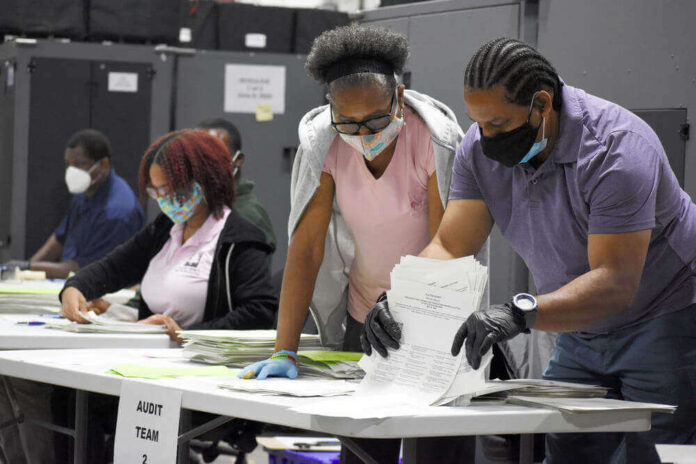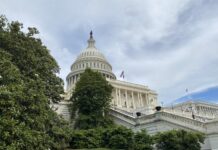
(Georgia Recorder) — The Georgia State Election Board pushed through proposed Right-wing Republican election rules Tuesday that have sparked fierce debates over giving county officials greater authority to refuse to certify voter tallies.
Today, certification by local election boards is considered an administrative task that doesn’t allow members to delay as they investigate results provided to them by county officials. The new process could delay the certification of a Georgia election in a large county if a single board member called for an investigation into equipment or administration of the vote.
Tuesday’s election board meeting comes on the heels of Saturday’s campaign rally in Atlanta, where former President Donald Trump praised conservative Georgia election board members Rick Jeffares, Janice Johnston, and Janelle King for their staunch support of new election policies in Georgia. That included the significant rule adopted Tuesday that allows local election board members to exercise their discretion of “reasonable inquiry” to review documents and other election-related information prior to voting on certification.
Prior to the most recent election board meeting, Democratic Party state lawmakers and organizations, including Citizens for Responsibility and Ethics in Washington, Fair Fight Action, the ACLU of Georgia, Common Cause Georgia, and Public Rights Project, urged the election board not to adopt a rule that would allow partisan election board members to potentially sabotage the Nov. 5 election.
The new rule became effective after Tuesday’s vote. Under Georgia law, county election boards are required to vote on certifying election results within six days after Election Day. The Georgia Secretary of State is mandated by law to verify the statewide results for the upcoming presidential election by Nov. 22.
The new rule allows local election board members to request insight from election supervisors and staff as well as access other election-related materials to base their decision to sign off on the vote count local officials provide, or refuse to certify the results.
The new rule could lead to more legal challenges over a state law that still requires county boards to certify the results as part of their normal election duties. Several Republican Georgia county election officials declined to certify the results of recent elections, but their efforts were thwarted by boards controlled by Democrats.
The proposal was presented Tuesday by Fulton County Board of Registration and Elections Board member Michael Heekin, who stressed the importance of due diligence by officials before signing legal documents signaling the accuracy of an election.
Heekin said it is the responsibility of county election officials to ensure that potential voting irregularities or other issues have not affected the results.
The battle over election certification played out this year when Fulton County Election board member Julie Adams refused to certify primary election results and filed a lawsuit arguing that election officials be granted greater discretion over the process. The court case is still pending.
“You have to look at how the election was run. Were there problems? Was it a carefree election, or was it a snake bit?” Heekin said. “You would quantify what you need to know in discussions with the professional staff that run the elections.”
Democratic Electron Board Member Sara Tindall Ghazal, said that Heekin’s rule change doesn’t change a law that still requires the county board to certify the results by the Monday following Election Day.
“This doesn’t change anything in the statute,” she said. The statute still mandates that counties certify by 5 p.m. Monday and they will be in violation of state law if they refuse to do so.”
Johnston said the new rule aligns the duty of local election boards to oversee elections fairly. The local officials will use the opportunity to review the necessary paperwork and other information needed to ensure the results were tabulated correctly, she said.
“Sure, there is a (certification) timetable to be met and should be taken seriously,” she said. “Any board that would not certify should be able to provide very specific reasons why they are not.”
Georgia NAACP president Gerald Griggs said that it’s unwise to change rules during the middle of an election cycle, which could lead to needless confusing complications for voters.
“The focus should be on ensuring a smooth and transparent election where every eligible voter can participate without unexpected hurdles,” Griggs posted Tuesday on social media platform X. “Stability and consistency in election rules are crucial to maintaining the integrity of our democratic process. True Election Integrity would be not allowing the “Big Lie” to change election rules and procedures.”
According to Citizens for Responsibility and Ethics in Washington, the certification of elections by deadlines is a routine function of election boards, which still have the opportunity to investigate any discrepancy later.
“Certification is not an opportunity for county officials to engage in political grandstanding, make protest votes against election practices they dislike, or conduct free-roaming inquiries into the election results. Georgia law provides other avenues outside of the certification process to resolve allegations of error or fraud in election returns, including through the courts. If the Board were to approve this amendment, it would extend county officials’ powers far beyond what the legislature has specified.”
In another vote Tuesday, the three Republican election board members agreed to move ahead with a proposed rule that would expand poll watcher access while ballot tabulation is taking place during an election.
Detractors contend the new access could be used by partisan poll watchers to intimidate poll workers and threatens a state ballot secrecy law designed to protect the identifying information of voters.
The rule potentially expands the ability of partisan poll watchers to observe the processing of absentee ballots, provisional ballot verification, the sign off on election equipment and other vote count reconciliation processes.







